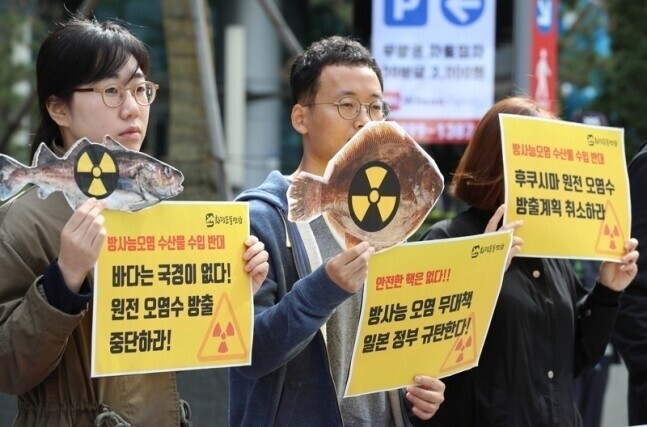hankyoreh
Links to other country sites 다른 나라 사이트 링크
[Editorial] Japan should listen to UN experts’ warning against release of contaminated water from Fukushima

“UN experts said today contaminated water still remaining at Japan’s Fukushima Daiichi nuclear plant poses major environmental and human rights risks and any decision to discharge it into the Pacific Ocean cannot be an acceptable solution,” the UN said in a press release on March 11.
Five special rapporteurs responsible for human rights and health rights sent the Japanese government a letter communicating their concerns.
“The primary source of radioactivity remains the melted nuclear fuel or corium located at the three Fukushima Daiichi reactors. Fresh groundwater entering the site continues to become contaminated as a result,” the experts said in their statement, which was posted on the website of the Office of the UN High Commissioner for Human Rights.
“The opacity surrounding the nature of the hazards posed by the contaminated water and the impact of its disposal as well as the lack of public participation in decision making processes only add to the dismay of affected populations,” the experts said.
These remarks are largely consistent with repeated criticism offered by nuclear power experts both inside and outside of Japan.
“Japan has a continuing duty to prevent safety risks and exposure, especially the exposure of children and other vulnerable groups to radiation.”
The Japanese government has promised to release the water after filtering out high-level radiation through the Advanced Liquid Processing System. But data provided by the Tokyo Electric Power Company shows that only 30% of processed water falls within the acceptable range of radioactivity.
In addition to tritium, a low-level radioactive material whose risks are debated, this water was also found to contain high-level radioactive materials such as cesium and strontium, which can be fatal even in extremely small quantities.
It’s obvious that this contaminated water, if discharged into the ocean, would lead to an irreversible catastrophe, both for the marine ecosystem and also for human beings.
While ignoring these calls from the international community, the Japanese government said on March 11 that it would work to convince such countries as South Korea and China to roll back regulations on the importation of Japanese food.
A test found that a rockfish recently caught off the coast of Fukushima contained a level of cesium far above the acceptable amount, but the Japanese government dismissed that as an anomaly.
It’s unreasonable for the Japanese government to pressure other countries to open up their food markets while disregarding the issue of radiation exposure. That will only provoke further outrage from the international community.
“We will decide on our policy for dealing [with the contaminated water] in a responsible manner at the appropriate time,” said Japanese Prime Minister Yoshihide Suga during a visit to Fukushima on March 6.
The Japanese government needs to recognize that the issue of releasing contaminated water is a matter of concern not only for its own citizens and neighboring countries, but for people around the world. It needs to come up with a solution that will be acceptable to the international community. That’s what it would mean to deal with this issue in a “responsible manner.”
Please direct comments or questions to [english@hani.co.kr]

Editorial・opinion
![[Column] Season 2 of special prosecutor probe may be coming to Korea soon [Column] Season 2 of special prosecutor probe may be coming to Korea soon](https://flexible.img.hani.co.kr/flexible/normal/500/300/imgdb/original/2024/0426/3317141030699447.jpg) [Column] Season 2 of special prosecutor probe may be coming to Korea soon
[Column] Season 2 of special prosecutor probe may be coming to Korea soon![[Column] Park Geun-hye déjà vu in Yoon Suk-yeol [Column] Park Geun-hye déjà vu in Yoon Suk-yeol](https://flexible.img.hani.co.kr/flexible/normal/500/300/imgdb/original/2024/0424/651713945113788.jpg) [Column] Park Geun-hye déjà vu in Yoon Suk-yeol
[Column] Park Geun-hye déjà vu in Yoon Suk-yeol- [Editorial] New weight of N. Korea’s nuclear threats makes dialogue all the more urgent
- [Guest essay] The real reason Korea’s new right wants to dub Rhee a founding father
- [Column] ‘Choson’: Is it time we start referring to N. Korea in its own terms?
- [Editorial] Japan’s rewriting of history with Korea has gone too far
- [Column] The president’s questionable capacity for dialogue
- [Column] Are chaebol firms just pizza pies for families to divvy up as they please?
- [Column] Has Korea, too, crossed the Rubicon on China?
- [Correspondent’s column] In Japan’s alliance with US, echoes of its past alliances with UK
Most viewed articles
- 1AI is catching up with humans at a ‘shocking’ rate
- 2‘We must say no’: Seoul defense chief on Korean, USFK involvement in hypothetical Taiwan crisis
- 3[Column] Season 2 of special prosecutor probe may be coming to Korea soon
- 4Korea sees more deaths than births for 52nd consecutive month in February
- 5Is N. Korea threatening to test nukes in response to possible new US-led sanctions body?
- 6Is Japan about to snatch control of Line messenger from Korea’s Naver?
- 7[Guest essay] The real reason Korea’s new right wants to dub Rhee a founding father
- 8[Editorial] Korea’s surprise Q1 growth requires objective assessment, not blind fanfare
- 9Division commander ordered troops to enter raging flood waters before Marine died, survivor says
- 10Park administration’s distorted history textbooks made public